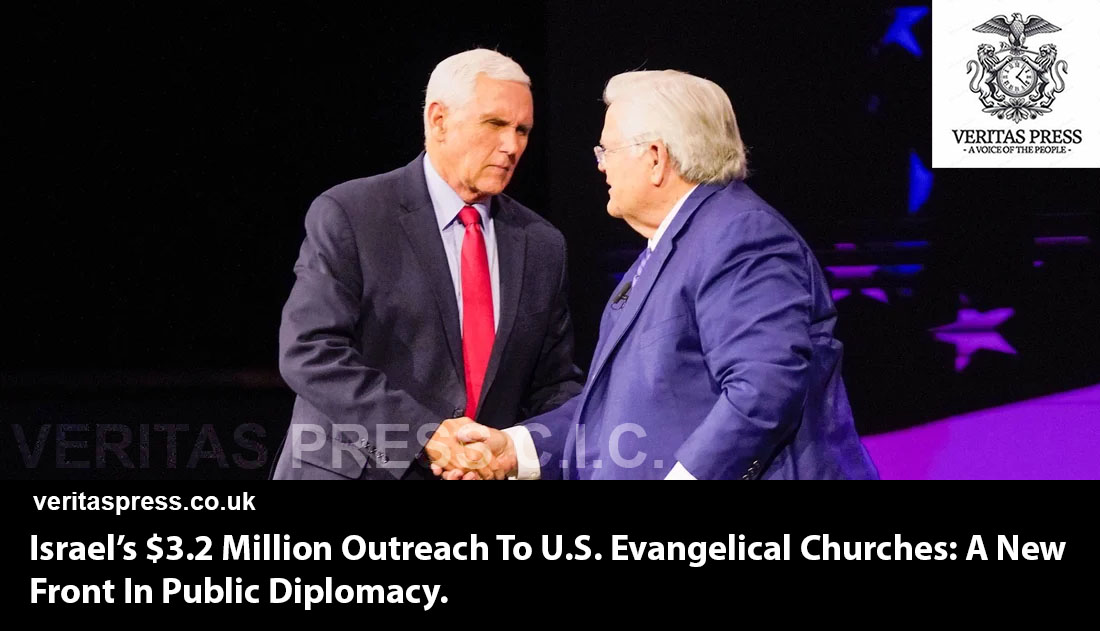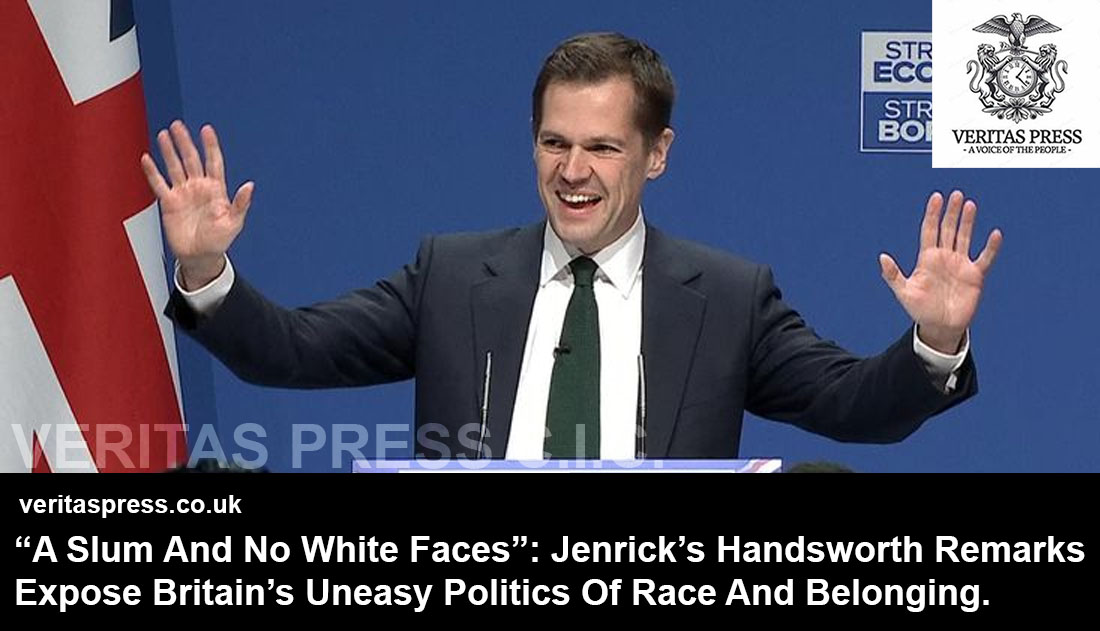Press Release: Veritas Press C.I.C.
Author: Kamran Faqir
Article Date Published: 08 Oct 2025 at 12:56 GMT
Category: US | Politics | Israel’s $3.2 Million Outreach
Source(s): Veritas Press C.I.C. | Multi News Agencies

Business Ads


A newly formed firm, Show Faith by Works, is reported to be orchestrating a $3.2 million campaign on behalf of the Israeli government that specifically targets Evangelical Christian churches in the United States. The campaign aims to reshape perceptions of Israel, promote pro-Israel messaging within Christian networks, and counter pro-Palestinian narratives.
Below is a clearer, updated narrative of what is known so far, who is behind it, how it is intended to work, what the risks and critiques are, and how it fits into a broader milieu of Israel’s communications and influence operations.
The Key Players And Organisational Structure:
Show Faith By Works
According to disclosures, Show Faith by Works is a newly established company contracted (for six months) to conduct pro-Israel outreach directed at U.S. churchgoers. Its stated goal is to build and bolster “positive associations with the Nation of Israel, while linking the Palestinian population with extremist factors.”
The contract leader is Chad Schnitger, who is reportedly receiving $150,000 for his role over the six months. In communications with the press, Schnitger has described early campaign documents as “planning options” and indicated that no contacts have yet been finalised with the celebrities named in the pitch.
Israeli Oversight: Eran Shayovich And “Project 545”.
Eran Shayovich, Chief of Staff at Israel’s Ministry of Foreign Affairs, is said to be overseeing the campaign. He also leads a broader strategic communications initiative known internally as “Project 545,” which is tied to Israel’s public diplomacy efforts (often referred to as hasbara).
Shayovich is also reportedly in connection with Brad Parscale (former Trump campaign manager), through whom digital content development and AI-targeted narrative campaigns are being coordinated.
Coordination With Other Firms:
Show Faith by Works is not functioning in isolation. Its work is routed through Havas Media Network, a global media and advertising group, which serves as a bridge to Israel’s broader PR and marketing infrastructure.
Other known Israel-funded operations include Bridges Partners, which has been contracted to manage social media influencer campaigns, and Clock Tower X, which is developing content and AI-framing strategies to influence how systems like ChatGPT respond to questions about Israel and Gaza.
Further, past FARA (Foreign Agents Registration Act) filings show that Israel’s foreign ministry has commissioned several U.S. firms to run influence, polling and PR operations, including SKDK, Stagwell Global, and others.
The Campaign Strategy: Messaging, Tools & Tactics:
Geofencing Major Churches:
One of the campaign’s core strategies is geofencing: creating virtual perimeters around major churches (and Christian colleges) in target states to deliver pro-Israel ads to attendees (or passersby) via mobile devices.
The proposal pledges to “geofence the actual boundaries of every major church in California, Arizona, Nevada and Colorado and all Christian Colleges during worship times,” then track attendees and retarget them with follow-up messaging.
This deployment is being described as the “largest geofencing and targeted Christian digital campaign ever.” The campaign estimates reaching 3.8 million churchgoers, hoping that 5–10% will actively respond by signing up for events, pledges, or next-step engagement.
The “10/7 Experience” Mobile Trailer:
Another signature element is a mobile “10/7 Experience” trailer, which would circle churches, campuses and Christian events. The trailer is intended to present visual and multimedia content about October 7, 2023, the Hamas-led attack, with narratives framing it through Israeli military communications—e.g. showing footage of IDF operations, civilian risk contexts, and “bad actors in hostile zones.”
Inside would be wall-mounted TVs, curated media, and messaging intended to contextualise Israeli actions in Gaza as defensive, while depicting Palestinian factions (or Iran) as existential threats.
Celebrity & Influencer Outreach:
The campaign’s pitch deck includes a list of proposed “Christian celebrity spokespeople” such as actors Jon Voight, Chris Pratt, Tim Tebow, Steph Curry, and various megachurch pastors. These figures, if recruited, would deliver pro-Israel messaging to their audiences.
To date, none of those figures have confirmed or been contacted (as far as available reporting indicates).
Additionally, the campaign intends to work with Christian social media influencers followed by younger Christians, paying them to produce counter-narrative content (e.g. response videos) challenging pro-Palestinian messaging.
Such sponsorship would likely trigger FARA registration obligations for the influencers themselves, as foreign lobbying experts have observed.
Messaging Framework & Talking Points
Documents associated with the campaign describe a two-pronged messaging framework:
- “Pro-Israel” Messages — emphasising Israel as a vibrant democracy, as a partner to the U.S., and presenting its military actions as necessary and constrained.
- “Anti-Palestinian State” Messages — framing Palestinian leadership (or Iranian proxies) not as land-conflict actors but as existential, genocidal threats; for example, claiming Palestinians “elect Hamas’s leadership,” or that Iranian goals are beyond territorial claims.
Interestingly, the documents gloss over or omit basic factual counterpoints: for example, the last parliamentary election in Gaza was in 2006, and many current Gaza residents did not vote for Hamas.
The campaign also references the objective of “combating low American Evangelic Christian approval of the Nation of Israel” (sic) and countering evolving pro-Palestinian messaging in a shifting global narrative.
Context & Trends: Why The Evangelical Angle?
Evangelical Support For Israel: Strong But Changing.
Christian Zionism — the theological and political belief that Christians (particularly Evangelicals) should support the state of Israel- has long shaped U.S. pro-Israel advocacy. Organisations like Christians United for Israel (CUFI) mobilise millions of U.S. churchgoers around Israel-friendly policies. Wikipedia
Surveys still show substantial pro-Israel sentiment among white evangelical Protestants: for instance, a July poll cited in one of the coverage pieces found that 72% of white evangelicals have a favourable view of Israel.
However, other polling suggests generational cracks. A Barna Group poll from 2021 found support for Israel among younger evangelicals (ages 18–29) falling from ~75% to ~34% (pre-October 7). Some analysts interpret this as a sign that younger, more socially progressive Christians may be more receptive to Palestinian narratives or critical of Israeli policies.
In this context, the campaign designers seem to believe that the traditional Evangelical base needs renewal or reinforcement, both digitally and on the ground, especially among younger cohorts.
Israel’s Broader Propaganda / Information Warfare Apparatus:
This campaign is squarely in the tradition of Israeli hasbara (public diplomacy). But in the current Gaza war, that apparatus has grown in scale, sophistication, and technological reach.
Recent FARA disclosures have revealed sizable budgets and multi-pronged programs:
- A $150 million additional allocation (approved last year) to Israel’s foreign ministry for global messaging and reputation campaigns.
- Havas (via its German division) is coordinating state-funded digital campaigns, influencer networks and AI training pipelines.
- Clock Tower X’s involvement in “GPT framing” — planting pro-Israel content to influence responses in AI systems (e.g. ChatGPT).
- The Esther Project, a roughly $900,000 influencer campaign paying U.S. Instagram and TikTok creators up to $7,000 per post to produce pro-Israel content.
- Polling and narrative testing by firms like Stagwell Global and SKDK, focusing on framing Israel’s war in religious, terror, and existential threat terms.
Taken together, this shows a coordinated, multi-level push: high-level diplomatic messaging, digital narrative curation, influencer engagement, and now faith-based direct outreach.
Legal, Ethical, And Strategic Questions:
Foreign Influence And FARA Compliance:
Because Show Faith by Works is operating on behalf of a foreign government (Israel), its activities fall within the scope of the U.S. Foreign Agents Registration Act (FARA). The firm must register and disclose its financial and operational relationships.
If the campaign influences individual social media influencers or churches (especially through paid content or sponsorship), those actors may themselves have to register under FARA or at least disclose foreign support. Experts noted in media coverage that influencers may be obligated to reveal that the content is foreign-sponsored.
Propaganda Vs. Persuasion: Ethical Boundaries:
Critics argue that what is being deployed here crosses from conventional public diplomacy to targeted propaganda, especially given the blending of messaging with selective narrative control and omission of context.
Given the war in Gaza, which has sparked accusations of war crimes, siege, civilian harm, and famine, any campaign that seeks to downplay or sanitise those realities risks complicity in (or facilitation of) narrative distortion. Several PR ethics bodies have condemned such practices and called for higher transparency.
One commentator observed:
“It is very hard to imagine a way in which a PR firm could work with a state (such as) Israel that is in the process of genocide … and not violate that cardinal principle.”
Risks Of Backlash And Credibility Hit:
- Church pushback: Many Christian leaders may resist the notion of being directly targeted by a foreign government, particularly given sensitivities around sovereignty, religious independence, and unwanted political influence.
- Rejection by celebrities: The named figures may decline association once the full scope is known, fearing damage to their reputation or being drawn into a politicised war campaign.
- Perception of manipulation: If congregants or social media users detect that ads are overly tailored, manipulated, or disingenuous, trust may erode, undermining long-term relationship-building.
- Regulatory scrutiny: U.S. regulators and watchdogs may examine the campaign under FARA, possibly leading to fines or legal challenges if disclosures are incomplete or misleading.
Effectiveness Uncertain:
Even if fully implemented, it is unclear whether geofencing churchgoers or showing them a trailer will meaningfully shift deeply held beliefs or policy opinions on Israel-Palestine. The campaign estimates a 5–10% “engagement” or footprint among those reached, a modest conversion given the investment.
Moreover, the narratives being deployed (e.g. the framing of Palestinians as inherently genocidal) may be contested or rebound in public debate.
Recent Developments & Media Response:
- The story was first widely reported by Responsible Statecraft, which obtained campaign documents and filed disclosures to expose the operation.
- Palestine Chronicle also covered the report, summarising the same essentials.
- In media statements, representatives for the celebrities named (e.g. Jon Voight) said they were unaware of formal offers.
- Schnitger has pushed back that the original pitch documents were “early planning” and that changes have been made since, though he declined to specify what those changes are.
- Observers in the PR industry are increasingly scrutinising how state-backed messaging campaigns operate in democratic societies, calling for stricter ethical standards, more transparency, and accountability.
Broader Significance & Strategic Implications:
This campaign brings into relief several larger trends:
- The fusion of faith and diplomacy
Targeting faith communities (especially politically active ones like U.S. Evangelicals) connects spiritual identity with geopolitical advocacy. Campaigners recognise that for many Americans, religion shapes their worldview more strongly than intellectual policy analyses. - Digitally empowered narrative warfare
Geofencing, mobile trailers, influencer micro-targeting, and AI-based content seeding are all tools of the 21st-century narrative battleground. The campaign reflects how war isn’t only fought on land or air, but in algorithms, social platforms, and personal devices. - Narrative contestation in conflict zones
Israel is evidently arming itself not just militarily but rhetorically, seeking to dominate interpretations of its conduct in Gaza, discredit counter-narratives, and reinforce political support at home and abroad. - Democratic vulnerabilities
When foreign governments intervene (even legally) in domestic group networks like churches, it raises questions about sovereignty, manipulation, and the integrity of civil society. - Changing base dynamics
As younger Christian cohorts become more sceptical of Israel’s policies, this campaign may represent an attempt to reverse or slow that shift before it becomes entrenched.

























